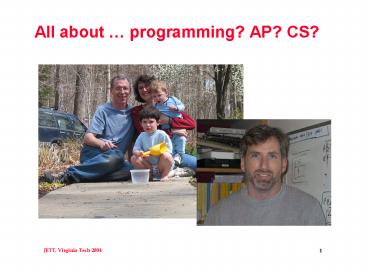All about programming AP CS - PowerPoint PPT Presentation
1 / 18
Title:
All about programming AP CS
Description:
Would students stay in the APCS Java subset? How would students ... apply online at: http://www.ets.org/reader/ap/requirements.html. JETT, Virginia Tech 2004 ... – PowerPoint PPT presentation
Number of Views:72
Avg rating:3.0/5.0
Title: All about programming AP CS
1
All about programming? AP? CS?
2
Questions going into APCS 2004
- Would Java switch change number of exams?
- Would teachers/students handle the switch
effectively? - Would students stay in the APCS Java subset?
- How would students react to new areas of
emphasis? - object-orientation
- design questions
- Java collections
- Would students know Java Marine Biology case
study? - How would scores compare with last year?
3
APCS Exam Count
- 2004 13,879 A
- 5,843 AB
- 19,722 exams
- slight drop from 2003
- 14,674 7,071 21,745 exams
- no "jump" as with the C switch
- 1998 (last Pascal year) 10,535
- 1999 (first C year) 18,837
4
2004 A Free Response Questions
- A1 Word List
- traverse an ArrayList of words, count then remove
words of specified length - A2 Pet Parade (Design)
- design and implement classes in a hierarchy
(abstract Pet ? Cat Dog ? LoudDog) - A3 Pond Stocker (MBS)
- add functionality to class that manipulates the
simulation environment - A4 Robot Cleaner
- traverse an array of items, picking up moving
using a complex algorithm
5
2004 Free Response Questions
- AB1 Library Items (Design)
- design LibraryItem interface, define LibraryBook
class that implements extends Book - AB2 Approval Voting
- iterate over Sets of votes, create and manipulate
a Map of results, analyze efficiency - AB3 Predator Fish (MBS)
- extend Fish class to exhibit new behavior
- AB4 Priority Queue
- implement PriorityQueue using a binary search
tree, recursive traversal/insertion
6
Growth in the Grading Process
- increased exam counts ? more readers for grading
exams - 2004 153 readers, 22 question leaders, 2 exam
leaders, CRD, CR - some questions finished early, turned to question
development
ACPS needs readers it's fun instructive! apply
online at http//www.ets.org/reader/ap/requiremen
ts.html
7
The Java Switch
- First year of Java perform comparability study
- 14 colleges administer sections of exam
- report student's grade on the exam/final grade
- correlation of these grades affects AP grade
setting
8
Grading issues with Java
- Questions designed with APCS Java subset in mind
- however, solutions that utilize
constructs/classes outside the subset are not
penalized (unless question specifically forbids
it) - Concern that unexpected solutions would challenge
readers - for the most part, students stayed within the
subset (maybe next year?!?)
9
Grading issues with Java continued
- as in previous years, some minor errors are
ignored - e.g., missing semicolons, instead of , case
discrepancies in identifiers (non flagrant) - In 2004, anticipating JDK 1.5, no penalty for
failing to downcast when accessing a collection - String word wordList.get(i) instead of
- String word (String)wordList.get(i)
- No penalty for not using wrappers (autoboxing
1.5) - counters.set(i, counters.get(i)1)
- counters.set(i,
- new Integer(
- ((Integer) counters.get(i)).intValue()1))
10
OOP emphasis
- Increased emphasis on object-orientation
- all problems with class design and/or
implementation (obvious, but not with C) - most problems used Java collections
- A2, A3, AB1, AB3 inheritance
- AB1, AB4 interface design and implementation
11
Problems with OO emphasis on exam
- common error not understanding class vs.
interface - interface definition but with instance variables
and constructor - Set s new Set() vs new HashSet()
- not recognizing when inherited data/methods could
be used - Shadowing parent class instance variables
- Overriding inherited methods
- Failure to call super
12
Design Questions
- 2004 placed a greater emphasis on design
- A2 design and implement class hierarchy
- AB1 design interface, implement it, extend class
- students did well (note very little algorithmic
complexity) - design questions were 2nd highest averages on
both exams - common errors see pevious slide
2004 exam data is preliminary
13
Java Marine Biology Case Study
- good news more students (especially AB) knew the
case study - Fewer blanks and zeros than previously,
especially on AB - A4 more blanks than A3
- AB2 and AB4 had more blanks than AB3
- AB3 had highest average score on AB exam 5.6
14
Comparison with Recent Exams
- A exam performance was comparable to recent years
- AB exam performance was slightly worse (bigger
change in exam?)
APCS A Exams
APCS AB Exams
15
Comparison MC vs. FR
- goal means of multiple choice and free response
to be 50 of max - in 2004, extremely close (51.3 for both exams)
- A exam free response actually higher percentage
(48.8 vs. 54.0) - AB exam multiple choice and free response
virtually same (51.1 vs. 51.6)
16
FYI AP Research on Performance
- AP Research conducted a study from 1996-2001
- 20 different colleges and universities, over
72,000 student - comparison of next-level college courses for AP
and non-AP students - FINDING students with AP credit performed better
than non-AP students
17
FYI of Schools with APCS Credit
18
Past, Present, Future































